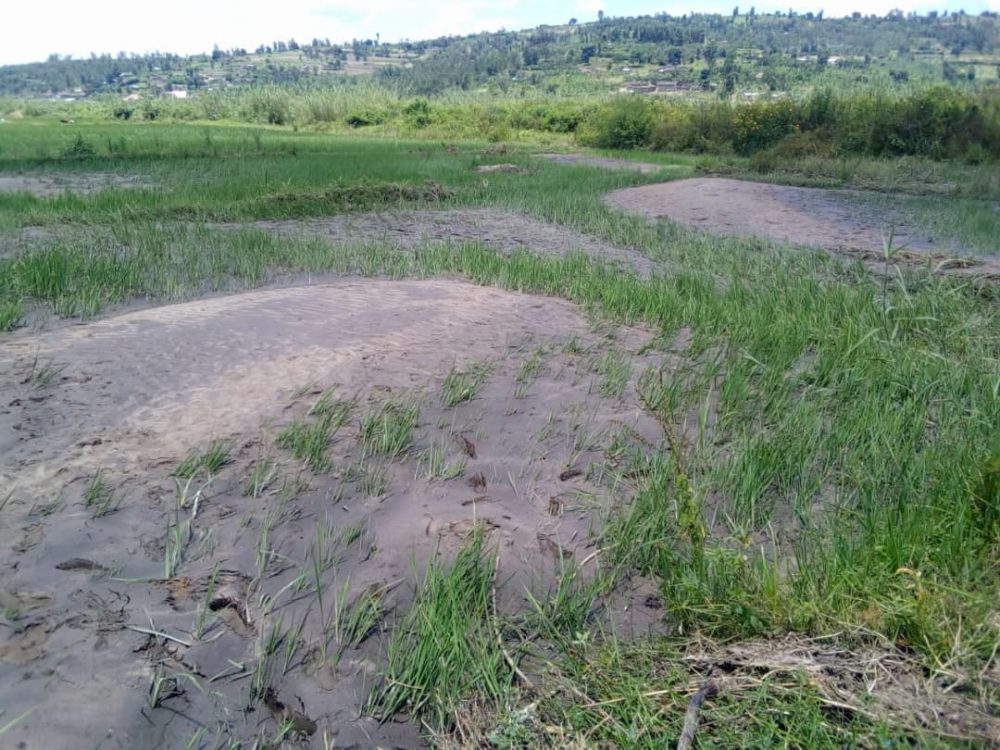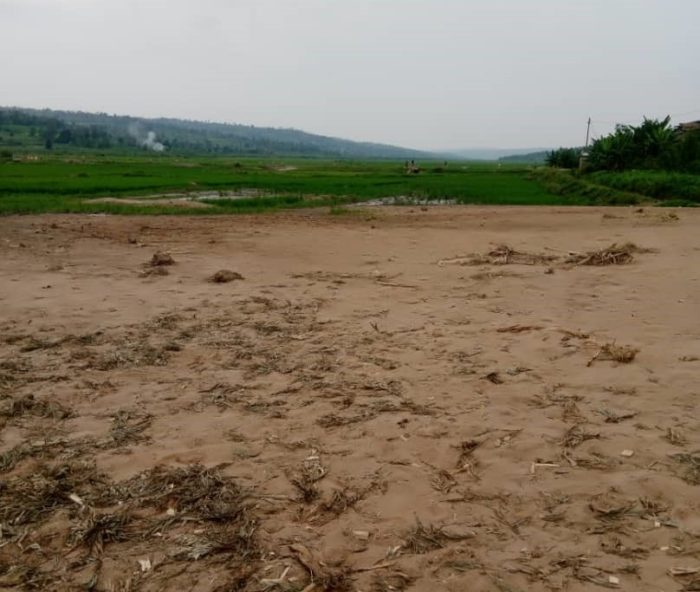Floods threaten food security and livelihoods in Rwanda as Covid-19 strikes the country
Date
March 30, 2020
Rwanda now struggles not only with the Covid 19 global pandemic but also floods that now threaten the agricultural activities and the countries food security.
On Friday the 20th March 2020, the area where one of our partner organization COOPRORIZE works was flooded by heavy rain. COOPRORIZ Abahuzabikorwa is a rice and banana growing cooperative located in Kamonyi district, Rwanda. The cooperative has over 2,000 members who are rice farmers and the area most affected is Mukunguli marshlands. The members of the cooperative lost over 52 hectares of rice due to the flooding.
“The heavy rains caused flooding in Mukunguli marshland and all of my 4 plots were washed off, I will not come back here for harvesting because nothing is left, I don’t even know where the demarcations of my plots are; it is all covered by sand”. Explains Mukamanzi Valerie. Valeria a mother of two children and a member of COOPRORIZ ABAHUZABIKORWA cultivated her 20 are piece of land (equivalent to 0.5 acres); investing 140000 FRW (149usd), and was expecting to harvest 1400 Kg equal to 371000FRW (395usd) almost double of her investment , but this will not be the case this season.

Following increased coronavirus cases in Rwanda the government has moved to enforce restrictions such as unnecessary movements and visits outside the home (except for essential services) to contain the spread of the virus, however, this will in return adversely affect the farmers who greatly rely on their farms and markets.
With the short heavy rainy season which is expected to continue until mid-May, there is no doubt that this will affect the farmer families in many ways, and Valerie fears that as a result of this flooding, their family’s’ income will drastically reduce because they will not have any produce for sale and even for feeding the children. Consequently, she will not have money to pay school fees for her children and buy farm inputs for the next planting season as well as cultivate her farm which now lies bare with sand, she said.
“Rwanda is a landlocked country with a moderate climate and relatively high rainfall. Previously Rwanda used to experience short (End of march-Beginning of May) normal rainfall, but in the past two years owing to the changes in weather patterns, we started experiencing short heavy/intensified rains which result into floods. This presents different challenges for different regions: the mountainous west and north of the country has been subject to erosion and landslide, parts of the central and south also experiencing severe floods and erosion as the case of our partner called COOPRORIZ located in Kamonyi district, and the east and southeast suffering from droughts and desertification” says Claude Rutayisire Partnership officer Vi Agroforestry Rwanda.
Considering the current impacts of climate change, farmers need support to effectively cope with changing climate and to adapt to current and future climate change. He added.

Vi Agroforestry has been working with farmers in the region to addresses some of those issues by fixing some of the mitigation measures (Applying Agroforestry and SALM practices) against climate change effect to small scale farmers most vulnerable such as women and children through a partnership with local member-based organisation.
In recent weeks, the corona crisis has posed major challenges for both the organization’s operations in the regions as well as for that of the partner organizations. As of 29th March 2020 the number of cases reported in Rwanda rose to 70. – We try to get a clear picture of how our partners’ organizations are affected by the corona crisis. We are used to working in complex environments and we will also deal with this challenge, but it will require time, innovation and collaboration, says Anna Tibblin, secretary-general Vi Agroforestry.
Vi Agroforestry collaborates with around 40 partner organisations in four countries in East Africa; Kenya, Uganda, Rwanda and Tanzania. The Corona crisis has very suddenly posed major challenges for both the organisation’s own operations and for the partner organisations. The shrinking democratic space is becoming even more noticeable.